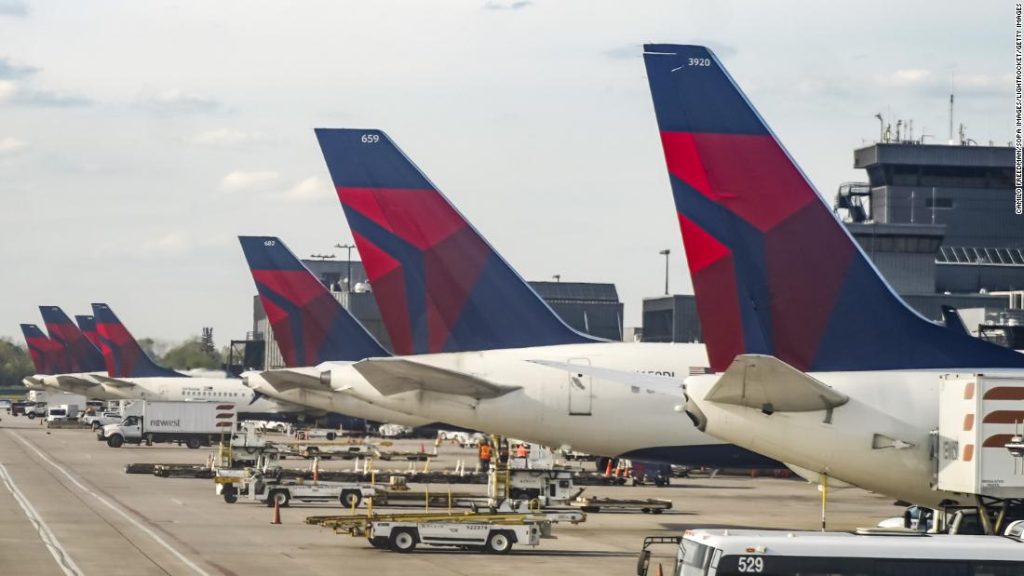
The company reported an adjusted net loss of $784 million in the first quarter, which is about $50 million less than Wall Street analysts had expected. Its revenue of $9.3 billion was $400 million more than forecast. The company said it was profitable in March.
The demand for travel is so strong right now that CEO Ed Bastian told CNBC that March was Delta’s best month ever for bookings — both for flights in March itself and for upcoming flights.
“The demand is huge,” he said on CNBC. “This is continuing in April. Consumers are ready to go.”
“There are clear signs of pent-up demand for travel and experiences as consumer spending shifts from goods to services and experiences, travel restrictions are lifted and business travelers continue to return to the skies,” he told investors on a conference call later Wednesday morning. .
Bastian said travel demand at the start of the quarter was negatively impacted by a spike in Covid cases from the Omicron variant, but that demand rebounded quickly as that spike began to subside in mid-February. He added that there are no indications so far of a negative impact on travel due to the Russian invasion of Ukraine.
This strong demand has translated into fuller aircraft and higher wages. Delta expects unit revenue, a measure of airline ticket prices, to increase more than 10% in the second quarter compared to the same period in 2019. Its unit revenue in March was higher than in March 2019, the first month since the start of the pandemic that the airline achieved a favorable comparison. .
“We managed to recover a large part of the increase in fuel,” Bastien told investors.
The first quarter is usually the slowest for US airline earnings and revenue. But the second quarter, which includes the spring travel season and the start of summer travel, should be even stronger.
An increasing number of workers are returning to the office after two years of remote work, and business trips are expected to rebound. As well as international travel. These passengers usually pay higher prices than leisure travelers on domestic flights.
Domestic business travel was still only about 50% of pre-pandemic levels throughout the first quarter, but by March, that had risen to 70%. A survey of corporate clients found 90% expect travel to increase in the second quarter, Delta President Glenn Hauenstein said.
Delta said it expects sales in the second quarter to be between 3% and 7% lower than in the same period in 2019, before the pandemic severely disrupted air travel. However, Delta flies at only 84% of the capacity it was flying at the time. Part of the reason is continued restrictions on international travel – but even domestic capacity is still only back to 90% of what it was before the pandemic.
Bastian said Delta is doing what it can to increase capacity, including hiring the additional staff it needs to get more flights back on schedule. But the 15,000 new employees the company has hired since the start of 2021 are still not enough to make up for lost staff during the pandemic, when Delta offered early retirement and takeover packages to reduce headcount.
“Maybe by the end of the year, if we really push that, we can go back to 100%. [of pre-pandemic capacity],” he told CNBC, but said that was not the current desire of the administration.
“Honestly, right now, for the amount of order we have, we’re sitting in a pretty good place [on capacity],” He said.
Haunstein added that the airline is not seeing any drop in demand as fares rise. “We haven’t seen much resistance to the price points that we have in the market,” he said.
But with a larger percentage of available seats already booked for the summer travel season than three years ago, price-sensitive customers need to book early and be flexible with their travel dates.
“We really believe that the epidemic has passed into a seasonal virus,” he said of the reason for the cancellation of these fees.
There is no clear scientific consensus yet on the seasonality of Covid-19.
However, Delta and the rest of the airline industry is facing soaring fuel prices.
Delta said it expects to pay an average of $3.20 to $3.35 a gallon for jet fuel in the second quarter, up from $2.79 a gallon in the first quarter and just $2.06 a gallon in the first quarter of 2019.
But the company has a significant advantage that most of its competitors do not: it has its own oil refinery. Higher fuel prices meant the refinery generated $1.2 billion in revenue in the first quarter, up sharply from just $48 million in the first quarter of 2019.

“Web maven. Infuriatingly humble beer geek. Bacon fanatic. Typical creator. Music expert.”





More Stories
Dow Jones Futures: Microsoft, MetaEngs Outperform; Robinhood Dives, Cryptocurrency Plays Slip
Strategist explains why investors should buy Mag 7 ‘now’
Everyone gave Reddit an upvote